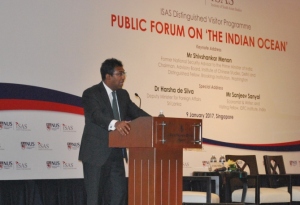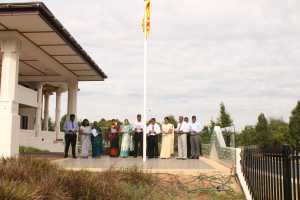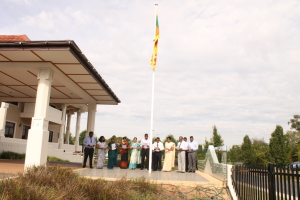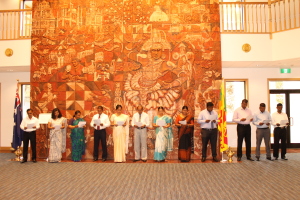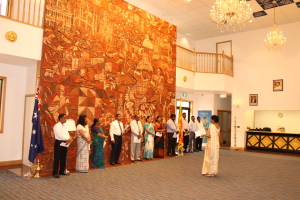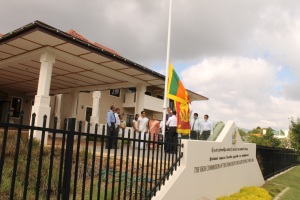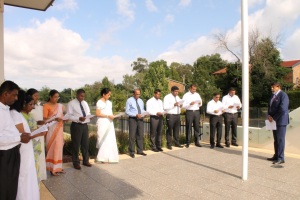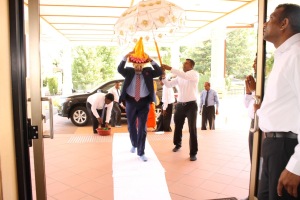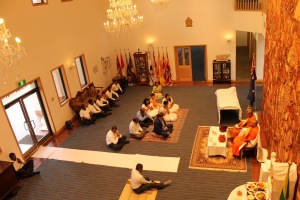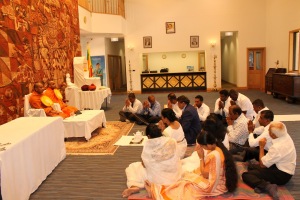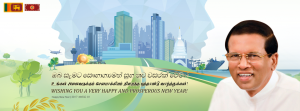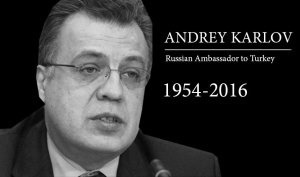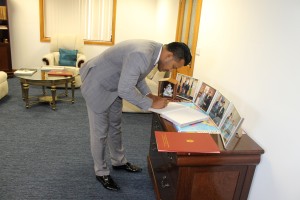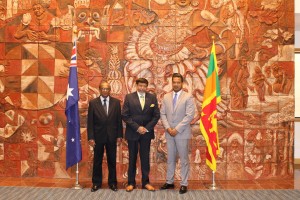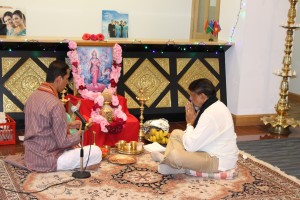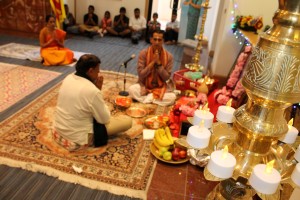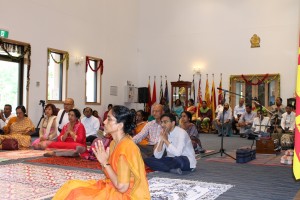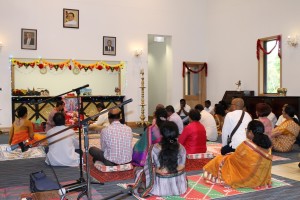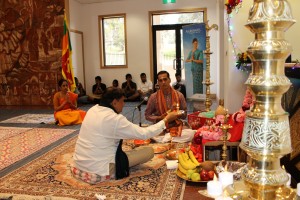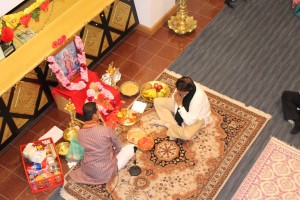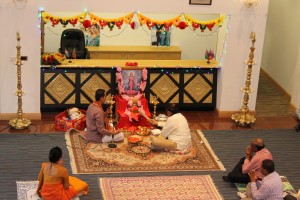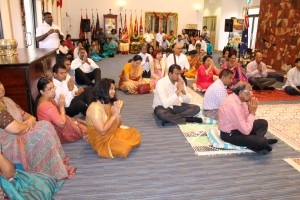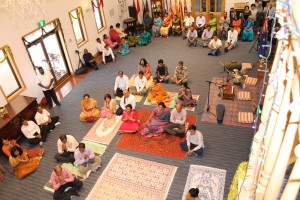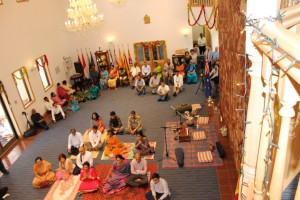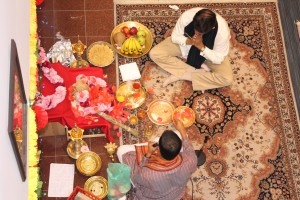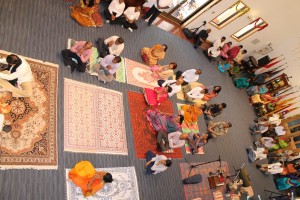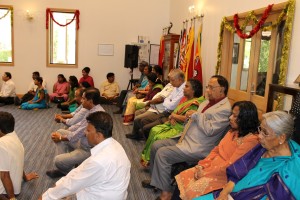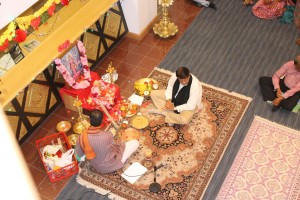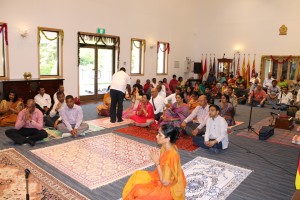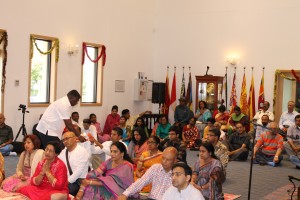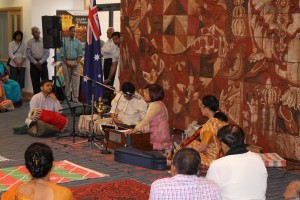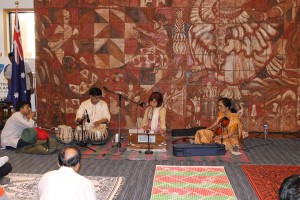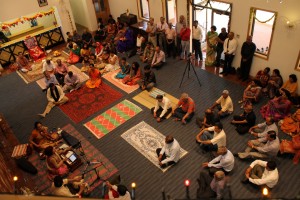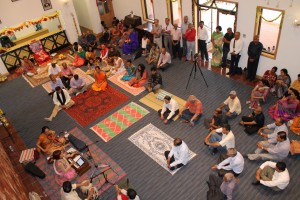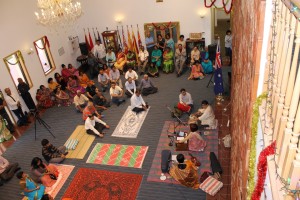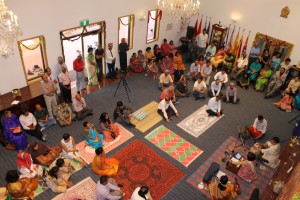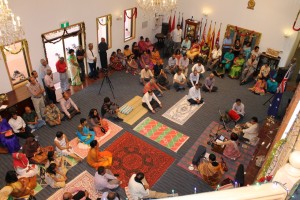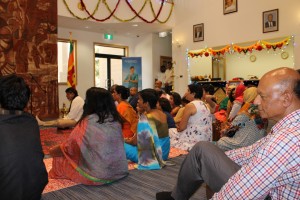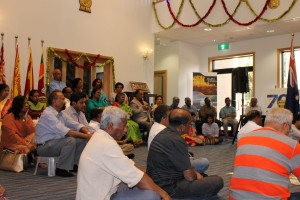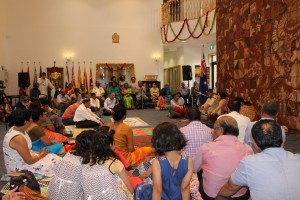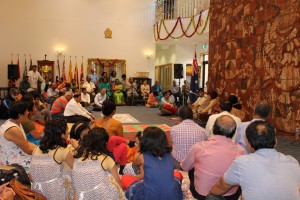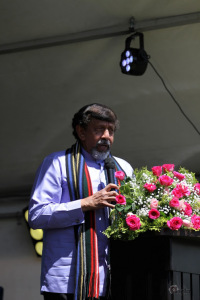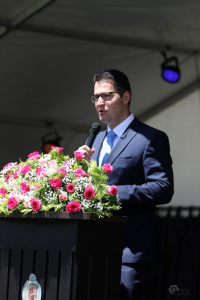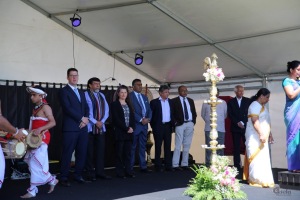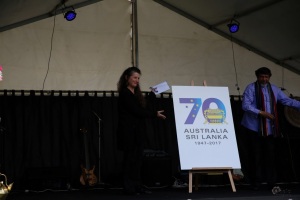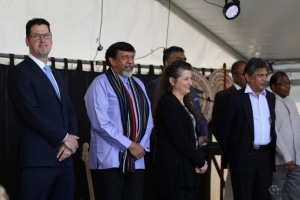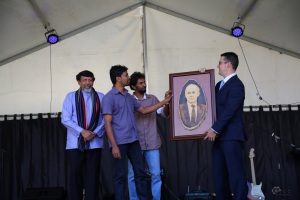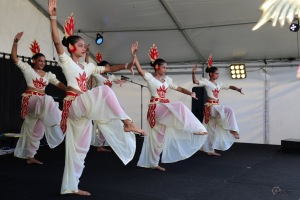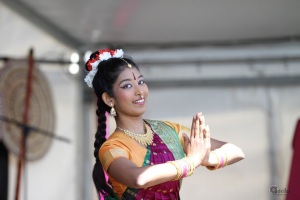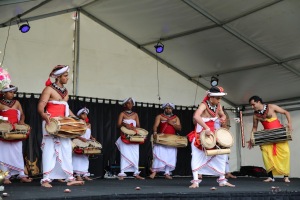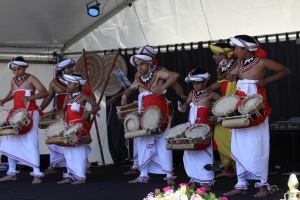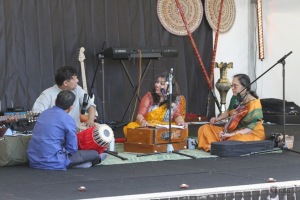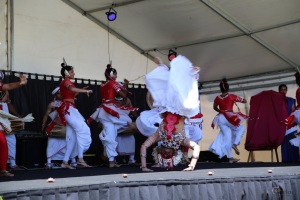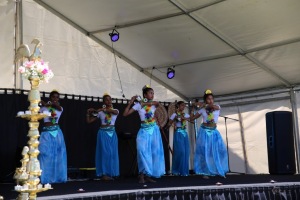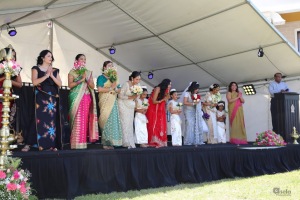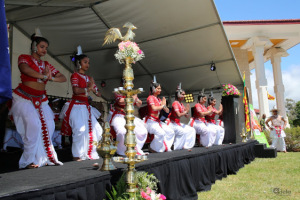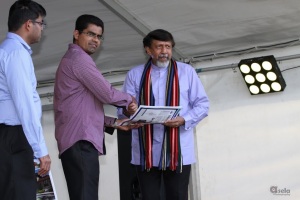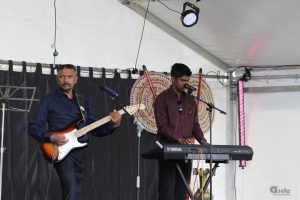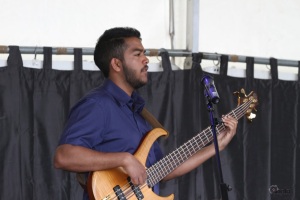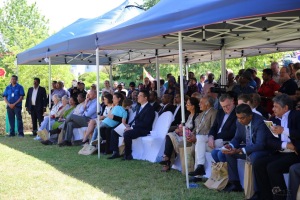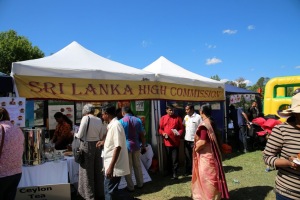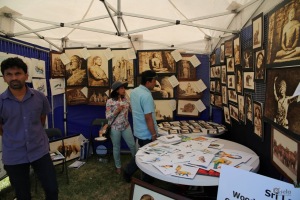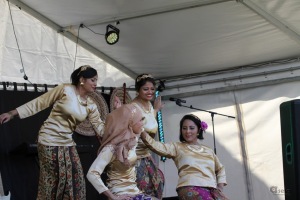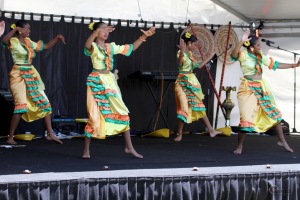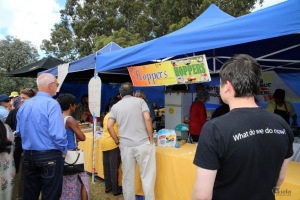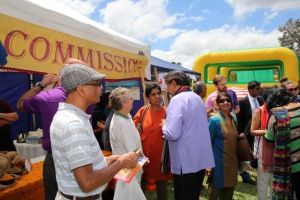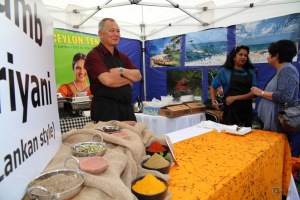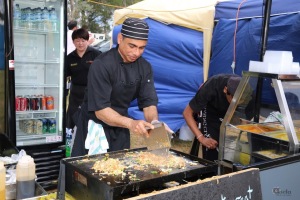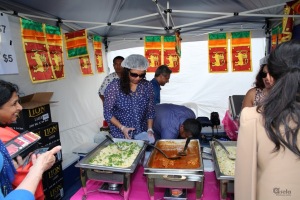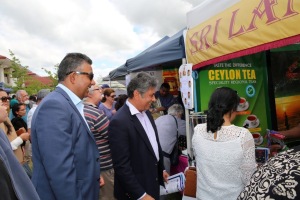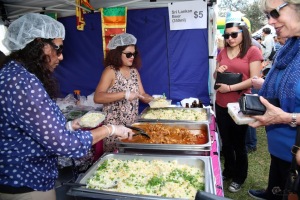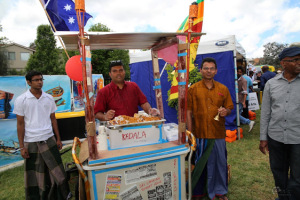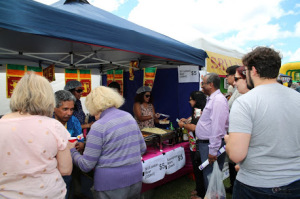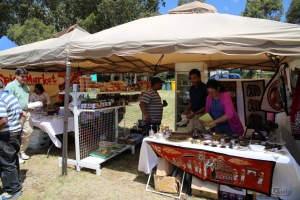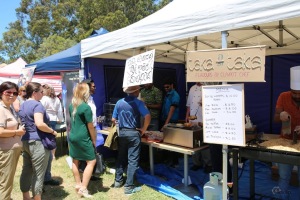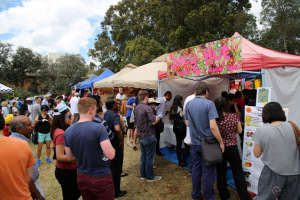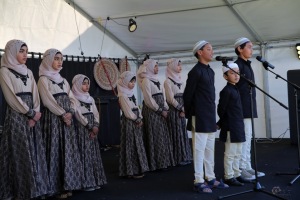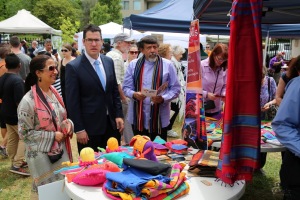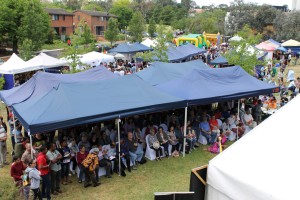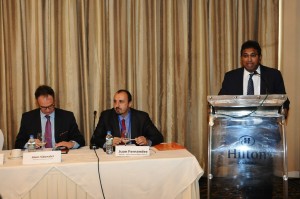


“Sri Lanka’s Role in the Indian Ocean and the Changing Global Dynamic” Speech by Dep. Foreign Minister Dr. Harsha de Silva at the Institute of South Asian Studies
January 14, 2017
“Sri Lanka’s Role in the Indian Ocean and the Changing Global Dynamic”
Speech by Dr Harsha de Silva, Deputy Minister for Foreign Affairs, at the Public Forum organized by the Institute of South Asian Studies, National University of Singapore, 9th January 2017
Ambassador Gopinath Pillai, Mr Shivshankar Menon, Mr Sanjeev Sanyal distinguished ladies and gentlemen, good afternoon.
Let me first thank Ambassador Pillai for inviting me to the Institute for South Asian Studies here at the National University of Singapore for this public forum on The Indian Ocean.
It is an honor for me to be here this afternoon and participate in this discussion. I bring greetings from the people of Sri Lanka.
Today marks the 2nd anniversary of an important turning point in Sri Lanka’s recent history. It is the beginning of the 3rd of the 5 year term of President Maithripala Sirisena. On 8th January 2015, the people of Sri Lanka went to the polls and on the 9thswitched from a government which had embarked on a divisive and authoritarian trajectory to one of convergence and National Unity.
For the first time since Independence, traditional rivals in Sri Lankan politics, eschewed adversarial politics to undertake pressing political and economic reforms in the long-term interests of the people. Sri Lankans demonstrated to the world that they could change a well-entrenched government, long considered to be undefeatable, by using a simple tool called the ballot.
It was an unexpected outcome to many, both outside and inside of Sri Lanka and demonstrated the importance of democracy.
Optimism in a changing global dynamic
During the last 2 years, we have achieved some notable successes as well as faced some complex challenges that have slowed down our progress. It is a trajectory that is inevitable in a democracy.
Sri Lankans are a resilient people who sustained a sense of optimism about the potential of their country even in the darkest moments of our history. Now, perhaps for the first time in our contemporary history, the future holds more promise than doubts.
We believe that we are at a stage of economic growth and political maturity, which combined with opportunities presented by global and regional developments, will allow us to propel ourselves to the next phase of development if we play our cards right.
Therefore, it’s with a sense of optimism that I approach this topic of my speech ‘Sri Lanka’s Role in the Indian Ocean and the Changing Global Dynamic’.
The moment one hears the two words Sri Lanka his or her mind travels to South Asia. And that is why we are here at the ISAS. However, for centuries Taprobane, Ceylon, Sri Lanka or whatever the island was referred to was the heart of the Indian Ocean.
So, we would like to position Sri Lanka more as that centre of the Indian Ocean.
The future prosperity of our people lies in how well we leverage our location in the Indian Ocean.
In order to accomplish our goals we must be vigilant on regional and global developments that will aid or hinder our path.
The year 2016 was a tumultuous year in politics and economics.
We are witnessing momentous changes in the structure of the global economy brought about by the relentless winds of globalization and the current manifestation of Western neo-liberalism.
It is reasonable to be concerned at the rapid pace of changes, and what it means for our economies.
The effect of Brexit and (and other possible exits from the EU) and the trade policies of the US-President-Elect will take some months, even years, to manifest.
And many will be observing with interest the interactions between China and the incoming US Administration.
It is in this context that many say that “Uncertainty is the new normal in business life”. Those countries and organizations which thrive in an era of uncertainty will be those who seize the opportunities presented by these uncertainties and take actions that can avert disasters and promote confidence and recovery.
So the emerging and uncertain global dynamics will present both challenges and opportunities to us in the Indian Ocean.
Sri Lanka’s historical role in the Indian Ocean
Our location has shaped our history so intrinsically for millennia and will continue to be so in the future.
In ancient times, Sri Lanka was important as the half way point between the two great empires of Rome and China and near the equator where navigational winds and monsoon effects changed directions. Therefore, it had strategic geographical advantages where global and navigational contexts were concerned.
The island featured prominently in the Spice Routes which were also known as Maritime Silk Roads. In fact, it is said that cinnamon from Sri Lanka and cassia from China found their way along the Spice Routes to the Middle East as far back as 2,000 BC.
Foreign merchants were attracted to ancient Taprobana because of its importance as a centre of international trade and some of them even settled in the island, particularly Moors, descendants of Arab traders to the island.
They were a dominant influence on the island’s international trade in the Polonnaruwa period in the 11th to 13th centuries; a position which they retained till the early decades of the sixteenth century.
An examination of the foreign relations of the island under the Polonnaruwa kings reveals political links with South-East Asia, in particular with Myanmar and Cambodia.
Peace and prosperity along the maritime Silk Road helped increase the volume of trade via the Indian Ocean, from which Sri Lanka naturally profited.
Much of this trade was in luxury goods, and in this respect, Sri Lanka was a transit point as well as a terminal point, the latter due to Sri Lanka’s own considerable luxury products such as gems and pearls.
However, ancient Sri Lanka was largely a self-sufficient agrarian economy and role of trade was a generally peripheral activity.
It was only after the collapse of the ancient hydraulic civilization at the end of the Polonnaruwa period that the country’s rulers began to pay greater attention to the economic possibilities of trade.
Exports of spices, particularly cinnamon, became an increasingly lucrative activity. During the period 13th-15th centuries, Sri Lanka’s position as a trade hub on the East-West maritime route had been established, as had its position as a gateway to India.
Sri Lanka had direct commercial links with Malacca, and also with regions in India such as Gujarat and Bengal.
During the colonial rule by the Portuguese, Dutch and lastly the English, the volume of foreign trade expanded. The tea trade which was started by the British still plays a significant role in the Sri Lankan economy.
However, in the last 500 years the Indian Ocean region lost its geo political and geo economic relevance; first to colonial dictates and in thereafter post-colonial cold war concerns.
Sri Lanka’s strategic role in the Indian Ocean
Now, for the first time in five centuries, global economic balance of power is once again shifting towards Asia. It is estimated that by 2030, Asia will surpass North America and Europe combined in global power based on GDP, population size, military spending and technological investments.
The global financial system is also moving away, albeit slowly, from the dollar dominated international system to a more multi-currency system.
New consumer markets are emerging all across Asia and the Asian middle class is expanding rapidly. Of the four largest economies of the world; US, China, Japan and India, three are located in Asia.
The busy East-West shipping route passes just six to ten nautical miles south of the island with more than 60,000 ships plying this route annually carrying two-thirds of global petroleum supply and half of all containerized cargo.
Thus, Sri Lanka’s situation in the nautical corridor between the East and West is of importance not only from a geostrategic perspective, but also from maritime economics and security perspectives.
We are under no illusion that as a small country, we can change the geo-political realities of the region surrounding us. Thus, a wise foreign policy is essential, not only for the present but to ensure the prosperity and safety of future generations.
Along with many opportunities, the renewed interest will also bring vulnerability to emerging competition among major naval powers.
The blue-water naval capabilities of key Asian States have ushered a new strategic environment, and the Indian Ocean has become an extremely important geo-strategic space.
While the maritime space of Asia is strongly connected to the Indian and the Pacific Ocean through trade and commerce routes, there is a difference in the power dynamics of the Pacific and the Indian oceans.
The power play in the Pacific is dominated by its proximity to the US, centrality to US security policies, and now the rise of Chinese naval power. In contrast, the Indian Ocean Region has maintained a multipolar characteristic.
Let us take a step back and consider when the change started. This transition in global power to Asia began with the economic awakening of East Asia, driven by the growth of China.
And the complementary growth of ASEAN countries; particularly Indonesia and Vietnam.
While the South Asian region has not matched the same level of development, the region is acquiring an intrinsic significance of its own underpinned by the growth of India.
Currently India is the fastest growing large economy in the world and the power transition in the Indian Ocean will be heavily influenced by South Asian developments.
The Indian Ocean plays a crucial role in the future of both these major powers.
The sea routes through the Indian Ocean are very important to China’s maritime trade and energy supply. Therefore, both countries will have to respect each other’s legitimate interests to ensure that their future prospects are not affected in the long term.
Unlike the Asia Pacific, the Indian Ocean region is not economically integrated.
No single power or a coalition will be able to maintain peace and stability on their own in the Indian Ocean. In capacity terms also, no country is capable of handling the maritime security threats and challenges in isolation, no matter how advanced and developed it might be.
In addition, it is preferable that the region continues its historical multi-polar characteristic and prevent a spillover of tension from other regions.
In such a background, all maritime nations have a role to play in ensuring the overall balance of strategic weight. Smaller nations such as Sri Lanka, even with comparatively limited maritime resources can become an integral element of maritime security in the region.
It is our view that the Indian Ocean is in need of a mutually benefiting security architecture established on a multilateral basis.
There is also space for an effective multilateral governing structure. In this regard, I may add that the Prime Minister of Sri Lanka has expressed an interest in crafting an Indian Ocean Order with accepted rules and agreements that would guide interactions between states. Speaking here in Singapore last year at the inauguration of the Indian Ocean Conference Mr. Ranil Wickremesinghe called for this Order to be built on a consensual agreement and that no singular State should be allowed to dominate the system.
The Indian Ocean Order would have the primary responsibility of upholding the freedom of navigation in the Indian Ocean, ensuring that shipping and air routes to East Asia and beyond are kept open, building closer economic cooperation amongst countries in the region.
In this regard, my Prime Minister called for a dialogue between SAARC and ASEAN leaders. Perhaps that can happen sooner than later and we would be delighted to play a role.
Be that as it may, Sri Lanka remains committed to preventing international terrorism, transnational crimes and people smuggling in the seas around our country. Supplementing the blue water capability of the Sri Lanka Navy and the consolidation of the Sri Lanka Coast Guard are areas of concern for our Government.
We are also reviewing the possibilities of integrating the capabilities of the Navy and the Air Force.
Repositioning Sri Lanka
The Government of Sri Lanka has a clear vision of what it wants Sri Lanka to be in the world today.
We are repositioning Sri Lanka to maximise our relationships with both our historic and new trading partners to leverage our geo-strategic position to make us a hub of the Indian Ocean as well as a transshipment port for the Bay of Bengal trade.
To fully tap this potential, Sri Lanka is engaging in initiatives with regional players who have major economic stakes in the Indian Ocean.
Sri Lanka is now pushing towards further integrating with the world by undertaking reforms to facilitate trade, and encourage productive foreign investment.
We have set a target of boosting exports to US$ 20 billion by 2020; an increase in exports of nearly 80% during 2016-2020.
It is unfortunate that in the last decade or so the previous government in Sri Lanka lost its focus on exports. Exports to GDP fell from 34% of GDP to less than 14%. So, it is critical that we implement our plans to leverage on our competitive advantages as now planned.
Unlike ASEAN which provides its members with a largely stable and peaceful regional environment to focus on economic development at formative stages of their countries’ development, SAARC has not been able to achieve the same level of regional integration.
These geo-political realities require that Sri Lanka build strong bilateral relations with Bay of Bengal members of ASEAN in addition to its fellow South Asian members. In addition, we cannot be content with our traditional markets, and we must look beyond for new opportunities.
India and Sri Lanka hope to finalize an Economic Technology Cooperation Agreement (ETCA) by 2017. The ETCA will enhance the scope of our existing Indian Sri Lanka FTA to extend freer movement of goods and services with the added emphasis of cooperation in the development of technology and in investments.
ETCA will provide an impetus to the existing synergies and has the potential to promote rapid growth of the sub regional economy between Sri Lanka and the five South Indian states, that is Tamil Nadu, Kerala, Karnataka, Andra and Telengana which today accounts for and economy of 500 billion dollars.
We are also negotiating a FTA with Singapore. Singapore already has a Comprehensive Economic Partnership Agreement (CEPA) with India. Therefore, we believe that by next year the Singapore-India (CEPA), the Indo-Lanka ETCA and the Sri Lanka-Singapore FTA will enable the southern sub region of South Asia and Singapore to establish a tripartite arrangement for trade and investments.
Sri Lanka is supporting the One Belt – One Road economic initiative, in line with the major historical role we played in the Maritime Silk Route. This will consolidate our position to become the Hub of the Indian Ocean while further integrating us with the Asian markets.
Chinese investments will be primarily directed to industrialization and further development of the Hambantota Air Sea Hub in southern Sri Lanka.
In addition a 1.4b dollar reclamation is now underway adjacent to the city of Colombofor the creation of a 560 acre Financial City, under English law, to fill the vacuum for offshore financial service between Singapore and Dubai.
Chinese investors have made significant commitments to invest equity in the China-debt strapped Hambantota port and the Mattala international airport the previous Government built; now as PPP ventures.
Our government is currently negotiating a 1.3 billion USD lease agreement with CMPort of China to lease the currently empty deep sea port to integrate with the proposed industrial zone.
It was just this Saturday we inaugurated the 15,000 acre, that is 50 square kilometer ‘Sri Lanka China Logistics and Industrial Zone’ to become a seriousplayer in global production networks.
It was revealed at the inauguration that Chinese investors were ready to bring in 5 billion USD in investments in to the zone in just the next 3 years.
The economic cooperation with Japan is as important to us. We are grateful that four decades of Japanese donor assistance has made a significant impact on our economic and social developments in Sri Lanka.
The Japanese Prime Minister has also appointed a senior official to especially coordinate Japanese Sri Lanka Joint Comprehensive Partnership Programme that was entered in to last year.
After some lull, Japan is once again also getting involved in several major infrastructure projects in Sri Lanka including Light Rail and expressways.
Many may not be aware that Sri Lanka also is home to the second largest natural harbor in the world in Trincomalee; said to be one of the finest deep sea harbors in the world.
In fact, there have been many sea battles to control the harbour. The Portuguese, Dutch and the English have each held it in turn. In 1942 the Japanese Imperial Navy attacked Trinco harbor and sunk three British warship anchored there.
While it has a large 99-unit tank farm built by the British during the war and mostly unused, except for some tanks by the Lanka Indian Oil Company, we have now initiated action to develop the port cenetred the larger Trinco development zone.
The government is working with India and Japan to develop Trincomalee with Surbana Jurong of Singapore already being contracted to draw up a city master plan.
The proposed container terminal at the Trincomalee Port will serve trade in India’s east coast as well as Bangladesh and Myanmar.
With the strong interest in utilizing the zones along the Southwest Corridor centered around the Colombo port and the Western Megapolis; logistics and industrial zone centered around the Hambantota air-sea hub and the North East corridor centered around the Trincomlee port development by investors from China, Korea, and Japan and also likely from India, we plan to create an export market focused on Europe, China, Japan and USA and the crescent of markets around the Indian Ocean.
Among the Middle East, Iran, Afghanistan, Pakistan, India, Bangladesh, Myanmar, Thailand, Malaysia, Singapore and Indonesia there exists a fast-growing population currently of over 2 billion people. This combined market has the potential of 3 billion consumers by 2050.
Going forward, our development strategy will be aimed at capturing trading opportunities within these identified Indian Ocean markets by pursuing trade liberalisation agreements with their governments.
We have already made the application to the European Union to regain the GSP+ facility for preferential access to the single market and are hopeful of an agreement by next year. European Commission has expressed their confidence that the GSP Plus trade concession would be given favourable consideration.
A concerted effort is also underway to improve the business climate domestically. Far-reaching governance reforms that are rules based have made investment and business more secure and certain.
Sri Lanka is taking measures to increase investor’s ease of doing business more directly. For example, we are bringing a number of government agencies together to create a one-stop investment and trade-facilitation shop under the Agency for Development.
We are reviewing our laws and regulations to create a simple rules-based business environment: including those related to land ownership, as well as tariffs and para-tariffs. We have adopted policies that enable private enterprise to thrive: for example, Sri Lanka has a simple 3 tier tax rate with the lowest at 14 percent. Together these reforms – alongside our educated workforce and solid infrastructure – are making Sri Lanka the most attractive, secure and competitive investment destination in the region.
Conclusion
In conclusion, I would like to point out that those of us who are geographically located in the Indian Ocean region have a primary interest in the security of the Indian Ocean, which is directly linked to our economies.
Therefore, managing competition and strengthening cooperation would be essential given both these economic and strategic security factors which have a direct impact on the future of this region. There will always be tension, such as between large countries and their smaller neighbors.
However, the countries in the Indian Ocean region have more in common in terms of history, culture and religion, than what sets us apart.
We believe that the Indian Ocean Region now facing an extraordinary opportunity to create something new in the global context and something historically uniquely beneficial to its people. Thank you.
National Integration and Reconciliation Week – 8 – 14 January 2017
January 9, 2017
The Sri Lanka High Commission in Australia commemorated the National Integration and Reconciliation Week on Monday 9th January at the High Commission in Canberra.
The commemoration started with the hoisting of the National Flag followed by the singing of the National Anthem in Sinhala and Tamil. Thereafter the Oath of National Integration and Reconciliation was affirmed by the staff in all three languages.
Acting High Commissioner Himalee Arunatilaka briefly outlined the importance and the need of national integration and reconciliation in the country, in order to achieve social and economic advancement in the post conflict environment. She said diversity is the strength in a multi-cultural society like Sri Lanka, and we need to build a “Sri Lankan” identity if we are to develop as a country. Sri Lankans living overseas play an important and essential role in national reconciliation; that is why the High Commission attaches such importance to promoting unity and reconciliation among the Sri Lankan diaspora community in Australia.
Sri Lanka High Commission
Canberra
9 January 2017
Click here – Pledge for National Integration & Reconciliation in Sinhala, Tamil, English.
Commencement of Work in 2017 by the Sri Lanka High Commission in Canberra
January 3, 2017
The High Commission commenced work on the first working day of 2017 on 2nd January, by hoisting of the National Flag, singing the National Anthem and affirming the Oath of the Public Servants by all staff. A two minutes’ silence was observed to commemorate members of the armed forces and all others who sacrificed their lives on behalf of the motherland.
Thereafter the High Commissioner made brief remarks on the importance of serving the public with honesty, integrity and commitment at all times. The High Commissioner underlined the need for all staff to remember at all times, that they are public servants paid by the people of Sri Lanka. They must therefore contribute towards meeting the Government’s goals and policies in developing Sri Lanka as one country, under one flag, with unity and harmony, while working towards alleviate poverty in 2017.
The High Commission staff, together with the two Buddhist Associations in Canberra also offered mid day alms to the Venerable resident monks of the Sri Lanka Buddhist Vihara in Canberra. The main purpose of the alms giving was to thank the two priests, the Ven. Moragollagama Rahula Panditha Thero and Ven. Veragoda Sujatha Panditha Thero, before their return to Sri Lanka in early 2017, for their services to the community in fostering unity and harmony and promoting reconciliation. The Ven. Theros also invoked blessings on; the High Commissioner and the staff to continue their close cooperation with the Sri Lankan community; the Government of Sri Lanka which has now been in office for 2 years to give it strength in bringing peace and development to the country; and on all people of Sri Lanka for a peaceful and prosperous year in 2017.
Sri Lanka High Commission in Canberra
3rd January 2017
New Year Message from His Excellency Maithripala Sirisena , President of Sri Lanka
January 1, 2017
The year 2017 dawns with new hopes of prosperity, coexistence and reconciliation in our hearts. The twenty two million people of Sri Lanka look forward to an era of sustainability with a determination to alleviate poverty in all its forms.
It is imperative that we overcome the challenges ahead of us. The progress of the human race was pioneered by people who faced challenges with confidence, utmost courage and determination amidst obstacles. Our goals could be achieved if we manage our work efficiently and productively, and do the right thing at the right time with unwavering commitment to serve the greater good.
The adverse effects of climate change show us the imperative need to be prepared for weather uncertainties. We have to be determined this year to live with nature and not above or against it.
I wish all of you a prosperous new year in which the fruits of progress are distributed fairly and the aspirations of the people are fulfilled.
Maithripala Sirisena
President
Sri Lanka condemns the assassination of the Ambassador for Russia to Turkey
December 21, 2016
Sri Lanka condemns, unequivocally and in the strongest terms, the assassination of the Ambassador for the Russian Federation to the Republic of Turkey, in Ankara, on 19 December. The Government of Sri Lanka extends deepest condolences to the family of Ambassador Andrey Karlov, and the Government and people of the Russian Federation.
Sri Lanka denounces terrorism in all its forms and manifestations. No cause or reason justifies terrorism, and we condemn this dastardly act as a heinous assault on the rights and immunities of all diplomats to represent their nations in safety and security around the world. While urging the authorities concerned to take all necessary action to ensure that those responsible are brought to justice we emphasize the need for the international community to work together to uphold and safeguard the rights and immunities of diplomats of all nations and international organisations in carrying out their work.
Ministry of Foreign Affairs of Sri Lanka
Colombo
20 December 2016
Christmas celebration at the Sri Lanka High Commission in Canberra
December 16, 2016
Christmas was celebrated at the Sri Lanka High Commission in Canberra with the participation of the Sri Lankan community on 15thDecember 2016.
Rev. Father Isuru Weliwatte from Melbourne delivered a blessing and a Christmas message highlighting the true meaning of Christmas. He pointed out that the modest surroundings in which Baby Jesus was born teach us humility which is the true spirit of Christmas.
First Honoray Consul for Sri Lanka in the Solomon Islands
November 24, 2016
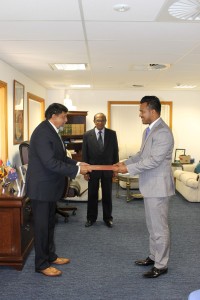
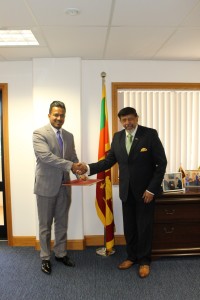
Mr. Kutila Pinto has been appointed as Sri Lanka’s first Honorary Consul in the Solomon Islands. He received his Commission of Appointment from High Commissioner Somasundaram Skandakumar in Canberra on 24th November.
Mr Pinto comes with a background in banking and is presently the Executive Director of the Pan Oceania Bank in Honiara. He has expressed a vision to expand the relations between the two countries and attract Sri Lankan investors to Solomon Islands, notably in the tourism sector.
Mr Pinto can be contacted at:
PO Box 855
Unit F1 & F2, First Floor
Grand Plaza Building
Town Ground, Honiara
Solomon Islands
Dedicated Number +677 42222
Mobile no: +677 7496723
E mail : kutilap@pob.com.sb
Sri Lanka High Commission
Canberra
24 Nov. 2016
High Commission celebrated Deepavali with Canberra community
November 21, 2016
Deepvali was celebrated at the Sri Lanka High Commission in Canberra with the participation of the Sri Lankan community on Sunday 20th November.
Religious ceremony was conducted by Pandith Pradeep Bhat of the Vishnushiva Mandir. High Commissioner Skandakumar in welcoming the guests observed that the ‘Festival of Lights’. celebrated the triumph of good over evil and the emergence of light over darkness.” As we approach the end of yet another year, and reflect upon it “, he wished everyone the true blessings of Deepavali in the year ahead. Thereafter the guests were treated to a music performance coordinated by the Tamil community in Canberra followed by a reception with traditional snacks and Sri Lankan tea.
Sri Lanka Festival 2016 draws unprecedented crowds in Canberra
November 14, 2016
Canberra community came in large numbers to savour a bit of Sri Lanka at the Sri Lanka Festival organised by the High Commission on Saturday 12th November in the High Commission premises. Over 3000 people representing the Commonwealth and Australian Capital Territory (ACT) governments, diplomatic corps, and the local community visited the Festival and enjoyed Sri Lankan food, culture and crafts of Sri Lanka.
Australian Assistant Minister for Social Services and Multicultural Affairs Senator Zed Seselja was the Chief Guest. Former Sri Lanka cricketer Asanga Gurusinghe travelled all the way from Melbourne to be present at the Festival. Addressing the Opening Ceremony, the Assistant Minister emphasised the importance of multiculturalism for Australia, and congratulated the High Commission and the Sri Lankan community for coming together in promoting Sri Lanka.
High Commissioner Somasundaram Skandakumar in his welcome address appreciated the participation and contribution of all Sri Lankan communities in Canberra which made the event truly Sri Lankan and depicted the diversity of Sri Lankan society. The High Commissioner also thanked the participation of cultural groups from Canberra and Sydney adding colour to the Festival and entertaining the visitors throughout the day. He particularly underlined the collective effort of the High Commission and the Sri Lankan community that contributed to the success of the event. Volunteers played a valuable role in selling raffle tickets, managing and supervising the children’s play area, conducting creative activities for children, face painting, providing medical and nursing care, compering, photo and video recording of the event, technical skills with sounds and electric supply and by assisting in innumerable other ways. Many Sri Lankans commended the effective organising of the event while one senior member of the community described it as “the most successful event held in Canberra witnessed since 1974”.
A portrait of the Australian Prime Minister Malcolm Turnbull done on wood using pyrography was presented to the Chief Guest by artists Malaka and Mahesh from Thermal Arts, who had come all the way from Sri Lanka to take part in the Festival.
The official logo for the celebration of the 70th anniversary of diplomatic relations between Sri Lanka and Australia in 2017, designed by the Department of Foreign Affairs and Trade (DFAT), was launched at the Festival by the First Assistant Secretary for South and West Asia Division of DFAT Ms. Kathy Klugman and High Commissioner Skandakumar. First Assistant Secretary Klugman, who is a former High Commissioner to Sri Lanka, briefly outlined the history of the relationship between the two countries while the High Commissioner mentioned some of the activities being planned in 2017 to commemorate 70 years of friendship.
The participation of two Sri Lankan companies showcasing art and handlooms and an astrologer were special features at the Festival. The High Commission, with the assistance of the Consulate General office in Sydney, conducted a tourism and tea promotion stall. Sri Lanka Tourism Promotion Bureau, Sri Lanka Tea Board and SriLankan Airlines contributed to the success of the event providing the stage, advertisements, raffle prizes, and promotional material.
Sri Lanka High Commission in Australia
Canberra,
14th November 2016
More photos : https://goo.gl/photos/DcckyPEHw4zxJz248
Remarks by Deputy Foreign Minister Dr. Harsha de Silva at Regional Consultations on Transitional Justice in Asia-Pacific
November 14, 2016
Remarks by Hon. Dr. Harsha de Silva. Deputy Minister of Foreign Affairs
Regional Consultations on Transitional Justice in Asia-Pacific
Hilton Colombo, 9 November 2016
UN Special Rapporteur on the promotion of truth, justice, reparation and guarantees of non-recurrence, Mr. Pablo de Greiff,
Acting UN Resident Coordinator Mr. Alain Sibenaler,
Officials from the Office of the High Commissioner for Human Rights,
Ladies and Gentlemen,
It is a pleasure to be here with you this morning, and I extend to all of you, a very warm welcome to Sri Lanka.
I understand that this meeting brings together State representatives, representatives of transitional justice mechanisms, national human rights institutions, NGOs, victims groups, UN officials, and representatives of regional organisations from the Asia-Pacific region to discuss and share experiences on transitional justice processes in the region.
I was informed that in accordance with the mandate given by the Human Rights Council to the Special Rapporteur, he was requested by the Council to gather relevant information on national situations, including on normative frameworks, national practices and experiences; identify, exchange and promote good practices and lessons learned; and recommend ways and means to improve and strengthen the promotion of truth, justice, reparation and guarantees of non-recurrence.
Accordingly, regional consultations have so far been held for the Middle East and North Africa, Latin America and the Caribbean, Africa, and Europe and North America. The region of the Asia-Pacific is the last on the list.
I feel that we are fortunate that by accident or by design, the consultations for the Asia-Pacific was kept to be done last, giving us this wonderful opportunity to welcome not only Mr. Pablo de Greiff, but all of you, to Sri Lanka.
As you all know, since the election of President Maithripala Sirisena in a historical Presidential election last January, Sri Lanka has embarked on a process of reconciliation. The two main political parties in Sri Lanka – the Sri Lanka Freedom Party led by President Sirisena and the United National Party led by Prime Minister Ranil Wickremesinghe have come together to forge a Government of National Unity. This is a step that is unprecedented in our nation’s history. In the words of President Sirisena in his inaugural address to Parliament following the General Election last August, this was a necessary step to obtain the bipartisan consensus that is required to face the important challenges before our nation, which include reconciliation and peacebuilding.
Therefore, Ladies and Genetlemen, this is an important moment in our history. We have acknowledged and recognised the need for reconciliation and the important contribution that transitional justice can make to this process of healing. Sri Lanka’s co-sponsorship of Resolution 30/1 titled ‘Promoting reconciliation, accountability and human rights in Sri Lanka’ is a manifestation of our strong commitment to this process.
Several initial steps in this long journey that we have embarked upon have been taken already. This includes the setting up, through an Act of Parliament, an Office on Missing Persons which is a component of the truth-seeking process. The legislation for this was enacted in August and the procedural steps for its establishment including the nomination of members by the Constitutional Council are now underway. A Task Force was appointed early this year, by the Government, comprising members of civil society, to hold public consultations, involving all stakeholders, to seek their views on the mechanisms for truth-seeking, justice and reparations.
This important process of national consultations has just concluded and the Task Force is scheduled to hand over their report to the President and the Prime Minister, this month. The designing of the truth-seeking, justice and reparations mechanisms will be informed by the report of this Task Force.
At the same time, we have undertaken a process of constitutional reform. A Resolution for the Parliament to sit as a Constitutional Assembly for this purpose was passed unanimously by our Parliament. The various drafting committees are presently at work.
Ladies and Gentlemen,
The processes that are underway here are in fact too numerous to list out and what I listed out are just a few.
For this process in Sri Lanka to be successful, we have to also ensure that the people of our country receive a quick economic peace dividend, and this is also an area on which we are focusing significant attention at the moment.
As contexts differ and there are no cookie-cutter models that can be adopted in sensitive processes such as transitional justice, this is a journey that our nation has to undertake and chart on its own. Yet, we cannot afford to experiment or make mistakes. Therefore, we rely on technical expertise as well as advice, and Pablo and the OHCHR officers have been excellent partners to us in our journey.
We have a long way to go and I am sure we have a lot to learn from best practices elsewhere. This is probably true for a lot of you here as well. Reconciliation is not a box that can be ticked or a journey that can end as per a timeline. There are no magic portions to achieve what we set out to achieve. It requires hard work and constant striving, and a commitment towards which our nation should be bound across generations. National building and healing are not tasks that have an end. This, we understand; and we want to ensure that after so many years of conflict, our nation does not plunge into conflict once again. So with this aim in mind, we set out on pursuing transitional justice to build a nation which respects and upholds the rights of each and every individual citizen of our country.
I wish your deliberations all success, and I hope that while you are here, you would also find the time to enjoy Colombo and Sri Lanka.
Thank you.
Register with the High Commission
The Sri Lankan High Commission in Canberra would like to keep in touch with Sri Lankans and persons of Sri Lankan origin living in Australia, New Zealand, Fiji, Papua New Guinea, Vanuatu and other Pacific Islands as well as Sri Lankan community organisations in those countries.
If you are a current/former Sri Lankan or an office bearer of a Sri Lankan community organisation we invite you to register with the High Commission.
RegisterAddress
Sri Lanka High Commission
61, Hampton Circuit
Yarralumla
ACT 2600

